Podcasting king shares ever-evolving bass insights with the world
Exclusive interview with FBPO’s Jon Liebman
January 20, 2020
Jason Heath is a bassist, teacher, clinician, and popular bass podcaster. He holds performance degrees from Northwestern University, and has extensive orchestral experience, including 16 seasons with the Elgin Symphony, and more than ten years with the Midsummer’s Music Festival in Door County. Jason has served as a member of the Milwaukee Ballet and IRIS Orchestra, and has played with the Lyric Opera of Chicago, Grant Park Symphony, and several other professional ensembles. He was a faculty member of DePaul University, teaching double bass, and has also taught at University of Wisconsin-Whitewater, Trinity International University and several other universities and high schools. Heath is an active clinician as well. For nearly a decade, he has been hosting Contrabass Conversations, which he describes as “a podcast devoted to exploring music and ideas associated with the double bass.”
FBPO: How would you describe what you do?
JH: These days, the simplest thing is just to say is I’m a musician. I used to try to say I do podcasts, I do this blog, I do some gigs, and blah, blah, blah. But at the end of the day, I realized I’m either writing about music, holding an instrument in my hand, emailing somebody about an instrument, doing some arrangement, or something like that.
FBPO: Do you have a main focus?
JH: Well, I’ve got a lot of irons in the fire. The bulk of what I do these days is my job with Eastman Strings, where I’m product manager for basses. They have me go to events, do artist relations, and work on new instruments, do clinics, and that kind of thing. It dovetails nicely with the interviews I like to do on location for the podcast and other projects. So, it’s a combination of events I get invited to, to be a clinician or a performer, or just to cover them. I try, at least once a year, to do a long trip that’s not tied into a podcast or an event, or anything like that, and just do interviews and that sort of thing. Those are my favorites.
FBPO: Have you been anywhere interesting lately?
JH: I went to New York City for a week at the end of 2018 just to do interviews for the podcast. I did an event in Australia, but I was in Australia mainly to do interviews. I went to Sydney and Melbourne and chatted with a bunch of people. I love doing that because you get a chance to see people in their native environment. For a lot of the people, I got to see a concert that they were playing, and spend some time with them and hang out and chat in a more relaxed setting. I love doing that.
FBPO: Let’s go back to the beginning. You’re from the Midwest, right?
JH: I’m originally from Sioux Falls, South Dakota.
FBPO: How would you describe your initial exposure to music?
JH: It was a fairly typical bass player upbringing. I tried a few different things and didn’t really dig it. Then found the bass kind of randomly. I started on violin when I was a little kid, then I went to this kind of rougher middle school, and I was worried about getting beaten up with that violin case. I met some guys that were starting a band and they said, “That’s kind of like a bass,” and so I started playing electric bass in this band called Toxic Death, which is the best name for a 14-year-old band, and moved over to the upright bass. I just kind of fell into the upright bass thing and really enjoyed it. Sioux Falls is not a big town, but it’s not too far from Minneapolis, it’s not too far from Omaha, so I went to the Twin Cities pretty regularly to get some lessons, and just decided this is going to be it. Actually, like soooo many bass players, double bass players particularly, Gary Karr came to town and played with the South Dakota Symphony Orchestra, and I saw him play and I saw my teacher playing duets with him up on stage, and I thought, “Okay, I want to do what that guy does.” That was kind of what kicked it off.
FBPO: Did you grow up in a musical household?
JH: Not particularly. My mom played trombone in high school. It wasn’t a particularly musical household. They went to the symphony and we had music on in the background, but it was not particularly so.
FBPO: Are there any qualities you find in upright players that are not found as often in electric players?
JH: Sometimes. I’m trying to think of an upright player I know that doesn’t also play at least some electric. I have to think for a while; there’s so much overlap. The bow. Oh my goodness! The complexities of the bow, when I really stop and think about it, it’s like this mystical paint brush. That’s a major difference. Obviously, the left hand is like a giant fretless electric bass with a different shaped fingerboard. But the bow, I mean… The left hand is so much more objective, like you’re on first finger, or you’re on second finger, you’re on the D string or the G string, you’re in tune, you’re out of tune. But when you get into the whole tone thing and the bow, and the body mechanics that go with it… I think they (upright and electric basses) converge a bit more when you’re talking about people that do a lot of jazz playing, or anything that involves a pickup and the amplifier. I think a lot of the thoughts and concerns, getting a good tone, possibly using some pedals or some sort of signal chain, I think there’s a lot of overlap there. Maybe the sort of nerdy world of classical orchestral bass performance that I’m in is maybe a little bit more removed, but there’s so much overlap.
FBPO: Do you occasionally encounter disdain for the electric bass among some of the so-called “purist” upright bass players?
JH: [Laughs] I’ve never seen anything like that. If anything, it’s been like bafflement at how they can do what they do on the electric. I think that would probably be the only thing. I have yet to meet a bass player that doesn’t love Jaco, regardless of what genre they’re in. The worst is that they might not have heard of Jaco, but then you rectify that. It’s a similar role no matter what kind of music you’re talking about. It’s that supportive instrument role and the bulk of what we do. I haven’t seen really any snobbery in terms of that. Maybe I’m just lucky. [Laughs]
FBPO: What’s keeping you busy these days?
JH: I got some help for the podcast, so the bulk of the podcast is handled by other folks. I prepare to talk with people and do some research and that kind of thing, but the podcast has taken up a lot less time. Working with Eastman continues to take up an ever greater percentage of my time, which I love doing. And I always seem to have some sort of project going.
FBPO: What lies ahead?
JH: I’ve been having fun and I’ve had a hard time coming up with a good rhythm for this, but (last) summer and into the fall, I bought some good video gear and I was putting together some how-to videos about bass extensions, and some practicing things, and that sort of thing. I had such a good time playing around with video, then I started to get busy with travel and I just haven’t done any more of it. I would love to find a way to incorporate that into my life a little bit more. I think it’s really interesting to plan that out and film it. I really like doing these trips where I just go and interview people for the podcast. I think I’m going to try to do one a year. I don’t know, maybe I’ll go to the U.K., maybe I’ll go somewhere else again on the East Coast. I love just getting out of town without any other events being associated with just going. It’s kind of like a learning vacation, and I come away with a hard drive full of interviews. I don’t know, man, I just enjoy learning a lot of new pieces on the bass, learning a bunch of new solo rep on the upright bass, which has been a fun, new thing for me to do these last few years. I’ve been playing with a tango band here in San Francisco. I’ve been exploring a few new musical avenues that I haven’t done so much of recently.
FBPO: What advice can you impart to our members who want to learn to play the bass?
JH: It’s the same advice I’d give to someone who wants to lose weight, or get in shape, or learn a foreign language, or anything like that. It is showing up consistently. It doesn’t have to be for a long time every day, but showing up consistently, having a plan, and executing that plan. Trying to do a couple things well, get in and get out every day. I think (it’s) a big challenge, if we’re talking about adult learners especially, folks who like, maybe they played bass in high school or college and then they came back to it, now they’ve got some more time. The tough thing is you know what is and isn’t good, but your chops are going to take time to get up to that point. The pace of progress can be frustratingly slow. Anyone who’s tried to lose weight, or get in physical shape, or learn a language knows that. You start off and you’re so excited, and then you hit that first plateau, you’re like, “Man, what am I gonna do?” But just showing up and trying to really be objective about what you’re doing, and trying to get better at something every day, even just a little bit, having a modest goal, and just achieving that (is important). I found it really helpful to record, whether it’s audio recording or video recording…
FBPO: If you’re brave enough!
JH: I think that’s a good point. I do think that when you’re really starting out, maybe wait a month or two before you even get into that because it can be kind of disheartening. You’re like, “Oh, I sound like a wild animal, just batting at this bass!” But pretty early on in the process, even once a week, or maybe once every couple days, record something, just a scale, just something. It’s hard to listen to yourself objectively when you’re actually playing because you’re thinking about, Where does that fourth finger go? Is that the D string or the A string? Do I have to go to a new fret, or shift to a new position? You’ll notice things that you’ll realize, like, “Oh, I’m buzzing. On every single note my fret’s buzzing,” or, if you’re an upright player, “Wow, my arco sound is total garbage.” It can be painful, but once you get used to it, people make so many gains just doing something like that, audio, or certainly video.
FBPO: What would you be if you weren’t a bass player?
JH: You know what I really want to be? There’s no money in it, but I want to be a tour guide. I want to be a San Francisco tour guide. I was so into Chicago, and Chicago architecture, and I’d explore all the neighborhoods. Now that I’m in San Francisco, I’ve got a stack of books about different neighborhoods in San Francisco. I just love exploring these different cities, and natural places too, but especially cities. I would totally love to be a tour guide.
See Jon’s blog, with key takeaways from this interview, here.
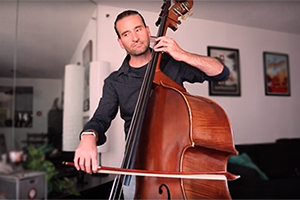
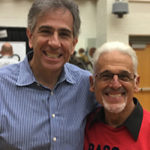
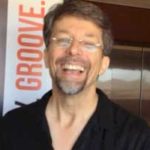
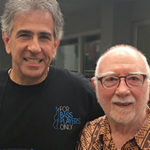
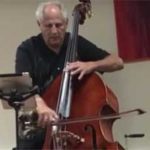
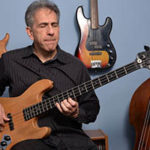

Thanks John and FBPO for this interview. Jason Heath’s podcast is interesting and informative. I’m brand new to contrabass and his guests have been very inspiring for me.